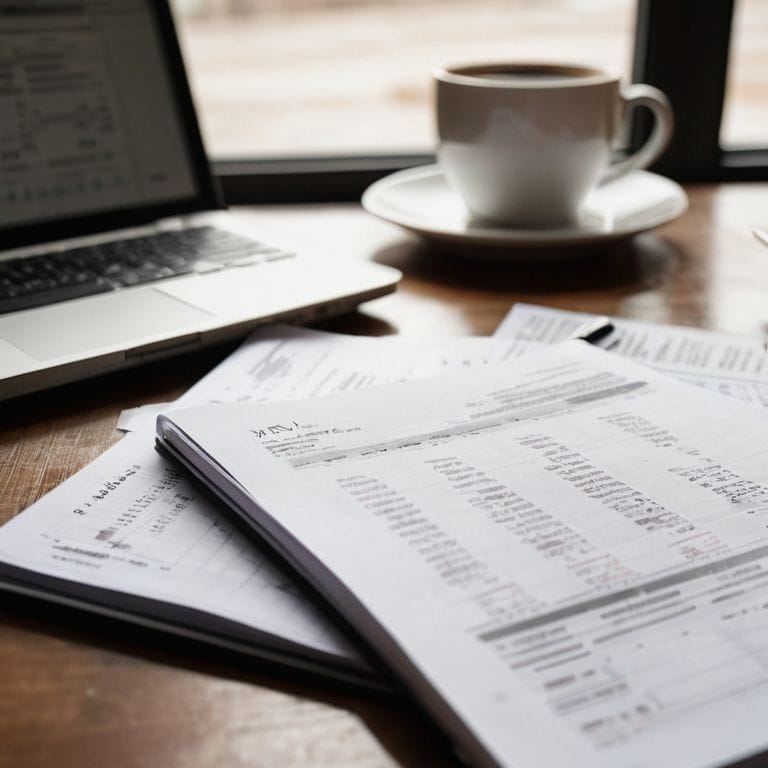I still remember the day I realized I had no idea how to build credit. I was trying to apply for my first apartment, and the landlord asked for a credit score. I had to admit, I didn’t even know what that was. Fast forward a few years, and I’ve not only learned how to build credit but have also paid off $30k in debt. If you’re looking for a guide to building credit, you’re in the right place. I’ve been in your shoes, and I know how overwhelming it can feel. But the truth is, building credit isn’t as complicated as everyone makes it out to be. It’s just a matter of understanding the basics and creating a simple plan.
In this article, I’ll share my personal story of how I went from having no credit to having a solid credit score. I’ll give you practical advice on how to get started, including how to obtain your first credit card, how to make on-time payments, and how to monitor your credit report. You won’t find any get rich quick schemes or unrealistic promises here. Just honest, no-hype guidance on how to build a strong credit foundation. By the end of this guide, you’ll have a clear understanding of how to build credit and be on your way to financial freedom.
Table of Contents
Guide Overview: What You'll Need

Total Time: Ongoing, several months to several years
Estimated Cost: $0 – $100
Difficulty Level: Intermediate
Tools Required
- Computer or Mobile Device (for online banking and credit monitoring)
- Calendar (to track payment due dates)
- Spreadsheets or Budgeting Software (for tracking expenses and income)
Supplies & Materials
- Secured Credit Card (if necessary, to establish or rebuild credit)
- Credit Monitoring Service (optional, for tracking credit score and report)
- Budgeting Workbook or Planner (for organizing financial information)
Step-by-Step Instructions
- 1. First, let’s start with the basics: understanding what credit is and why it’s essential. In simple terms, credit is a way for lenders to evaluate your trustworthiness when it comes to borrowing money. To begin building credit, you’ll need to open a credit account, such as a credit card or loan. I remember when I first started; I applied for a secured credit card, which was a great way to begin building my credit from scratch.
- 2. Next, you’ll need to make on-time payments. This is crucial because payment history accounts for a significant portion of your credit score. I’ve found that setting up automatic payments is a great way to ensure you never miss a payment. When I was paying off my debt, I made sure to pay more than the minimum payment each month to reduce my principal balance faster.
- 3. The third step is to keep your credit utilization ratio low. This means that you should try to keep your credit card balance below 30% of the credit limit. For example, if you have a credit card with a $1,000 limit, try to keep your balance below $300. I’ve learned that keeping my credit utilization ratio low has helped me maintain a healthy credit score over time.
- 4. Fourth, you should monitor your credit report regularly. You can request a free credit report from each of the three major credit bureaus (Equifax, Experian, and TransUnion) once a year. I like to review my credit report every few months to ensure there are no errors or suspicious activity. When I was paying off my debt, I found a few errors on my report that I was able to dispute and correct.
- 5. Fifth, consider becoming an authorized user on someone else’s credit account. This can be a great way to build credit if you’re having trouble getting approved for a credit card or loan on your own. Just make sure the account holder has good credit habits, as their behavior will affect your credit score. I’ve seen this work well for friends who were trying to establish credit for the first time.
- 6. Sixth, avoid applying for too many credit cards at once. Each application can result in a hard inquiry on your credit report, which can temporarily lower your credit score. When I was trying to build my credit, I applied for one credit card at a time, waiting a few months before applying for another. This helped me avoid any negative effects on my credit score.
- 7. Seventh, be patient and consistent. Building credit takes time, and it’s essential to develop good credit habits that you can maintain over the long term. I’ve found that setting reminders for my weekly “money date” helps me stay on track and ensure I’m making progress towards my financial goals. By following these steps and staying committed, you can build a strong credit foundation and achieve financial freedom.
A Guide to Building Credit

As I reflect on my own journey to financial freedom, I realize that establishing credit for beginners is a crucial step. It’s essential to understand the importance of credit utilization ratio and how it impacts your overall credit score. I learned this the hard way, but now I make sure to keep my credit utilization ratio below 30% to avoid any negative effects on my credit score.
When it comes to strategies for improving credit score, I’ve found that making timely payments and monitoring my credit report regularly are key. The credit reporting agency role is vital in maintaining accurate information, and it’s essential to review your report periodically to avoid any errors. I also make sure to avoid common credit score mistakes, such as applying for multiple credit cards in a short period, which can negatively impact my credit score.
In the long run, long term credit building techniques are essential for maintaining a healthy credit score. I’ve implemented automated payment systems to ensure I never miss a payment, and I regularly review my credit report to catch any errors. By following these simple steps and being mindful of my credit utilization ratio, I’ve been able to build a strong credit foundation and achieve financial stability.
Establishing Credit for Beginners
Establishing credit from scratch can be daunting, but it’s a crucial step towards financial freedom. I remember when I first started building my credit – it felt like a puzzle with missing pieces. To begin, you’ll need to open a credit account, such as a secured credit card or become an authorized user on someone else’s account. This will allow you to start establishing a credit history, which is essential for loan approvals and better interest rates in the future.
I started with a secured credit card, making small purchases and paying off the balance in full each month. It wasn’t glamorous, but it worked.
Strategies for Improving Credit Score
To improve your credit score, focus on making timely payments and keeping credit utilization low. I learned this the hard way when I was paying off my debt – missing a payment can drop your score significantly. Now, I automate all my payments to ensure I never miss one.
Keeping credit utilization below 30% is also crucial. I used to think that paying off my credit card balance in full each month was enough, but I soon realized that having a high credit limit and keeping my utilization low made a big difference in my credit score. By following these simple strategies, you can start seeing improvements in your credit score over time.
5 Crucial Tips to Supercharge Your Credit-Building Journey
- Make on-time payments a non-negotiable habit, as payment history accounts for a whopping 35% of your credit score
- Keep your credit utilization ratio below 30% to demonstrate responsible credit behavior and avoid negatively impacting your score
- Don’t open too many new credit accounts in a short span, as this can raise red flags and temporarily lower your credit score
- Monitor your credit report regularly to catch and dispute any errors, ensuring your credit score accurately reflects your financial situation
- Be patient and persistent, as building a strong credit profile takes time – think months and years, not days and weeks, to see significant improvements in your credit score
Key Takeaways for Building Credit
I’ve learned that building credit from scratch requires patience and a solid plan, which is why I recommend starting with a secured credit card or becoming an authorized user on someone else’s account
Monitoring and maintaining a good credit score is crucial, and I achieve this by setting reminders for my weekly ‘money date’ to review my finances and track my progress in my custom spreadsheet
By following my own journey as an example, I want to emphasize that financial freedom is within reach for everyone, and it starts with simple, sustainable habits like automating payments, finding cheaper alternatives for subscriptions, and consistently reviewing your financial progress
Building Credit, Building Freedom
Building credit isn’t just about numbers on a report, it’s about unlocking the doors to your financial future and taking control of your destiny, one smart decision at a time.
Alex Barnes
Taking Control of Your Financial Future

As we wrap up this guide to building credit, it’s essential to remember that establishing a strong credit foundation is a marathon, not a sprint. We’ve covered the step-by-step process of checking your credit report, making on-time payments, and keeping credit utilization low. By following these simple yet effective strategies, you’ll be well on your way to improving your credit score and unlocking better financial opportunities. Whether you’re just starting out or looking to recover from past mistakes, the key is to stay consistent and patient, as small habits can add up over time to make a significant difference.
Now that you have the tools and knowledge to start building your credit, it’s time to take the first step towards a brighter financial future. Remember, financial freedom is within reach, and it’s not just about the numbers – it’s about the peace of mind that comes with being in control of your finances. As someone who’s been in your shoes and has come out the other side, I can confidently say that the journey is worth it. So, go ahead, take that first step, and watch your financial landscape transform over time. With persistence and the right guidance, you’ll be unstoppable, and your financial destiny will be yours to shape.
Frequently Asked Questions
What are the most common mistakes people make when trying to build credit from scratch?
I’ve been there, and I’ve learned from my mistakes. When building credit from scratch, people often overlook making on-time payments, or they apply for too many credit cards at once, which can hurt their score. Others forget to monitor their credit report for errors, or they close old accounts, which can shorten their credit history.
How long does it typically take to see significant improvements in my credit score?
Honestly, it can take anywhere from a few months to a year or more to see significant improvements in your credit score. I’ve seen my own score jump 100 points in just 6 months by paying bills on time and keeping credit utilization low. Consistency is key, so stick to your plan and you’ll be on your way to a healthier credit score in no time.
Are there any alternative credit-building strategies for those who can't get approved for traditional credit cards or loans?
If traditional credit cards or loans are out of reach, consider alternative strategies like secured credit cards, becoming an authorized user, or taking out a credit-builder loan. I’ve been there too, and these methods can be a great way to start building credit from scratch.














